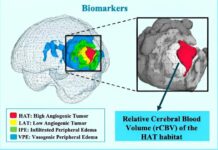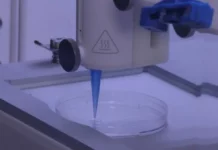Articular cartilage defects are a type of disease that damages hyaline cartilage in knee joints. This cartilage helps create smooth movement between the bones in the joint and cushions them when they bear weight, but may get damaged due to age, injury, or excessive wear and tear. Defects result in reduced joint motion, pain, swelling, and difficulty while walking. However, articular cartilage does not have a blood supply, so the cells i.e. chondrocytes cannot repair any damage.
Previously, the only treatment for such an issue was an open surgery to replace or repair the knee. This approach is traumatic and takes a very long time to heal. Therefore, a procedure called arthroscopic meniscal debridement is now gaining traction. This is a minimally invasive treatment that uses small surgical incisions to place gels inside the cavity.
The problem, however, is that these gels cannot withstand the constant water irrigation required in arthroscopic procedures.
Until now, that is.
Self-healing cartilage
A team of scientists from China has recently published a study in Science Advances that outline the production of light-cured and activated hydrogel that contains cartilage-making chondrocytes.
To carry out this procedure, doctors would first need to inject a small star-shaped scaffold into the surgical site. Next, they would inject the hydrogel into this scaffold and cure it using a light source, which would activate polymerization and cross-linking. These two reactions ensure that the hydrogel hardens quickly and adheres to the surrounding tissue so that it does not get displaced during the necessary irrigation.
Once placed, this hydrogel promotes the proliferation of the chondrocytes it contains, which will grow and fill the articular cartilage defect, healing it.
In the paper, the scientists explained that they held two pre-clinical animal trials to test the hydrogel’s use in vivo. The first one involved nude mice, where they saw that the gel was able to regenerate cartilage in 8 weeks.
They then moved on to testing the hydrogel on weight-bearing joints in pigs. They monitored the progress using MRIs, and 6 months later, they found that the cartilage had healed.
The team is now planning to test their hydrogel in human trials.
Source: ScienceAdvances
https://www.science.org/doi/10.1126/sciadv.abg0628




